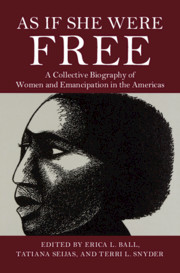Book contents
- As If She Were Free
- As If She Were Free
- Copyright page
- Dedication
- Contents
- Figures
- Contributors
- Elizabeth Catlett and the Form of Emancipation
- Acknowledgments
- Introduction
- Part I Claiming Emancipation during the Rise of New World Slavery
- Part II Experiencing Freedom during Slavery’s Expansion
- Part III Envisaging Emancipation during Second Slavery
- Part IV Enacting Emancipation in the Aftermath of Slavery
- 20 María Remedios del Valle, Nineteenth-Century Argentina
- 21 Lumina Sophie, Nineteenth-Century Martinique
- 22 Emma Lane Coger, Nineteenth-Century Illinois, Iowa, and Missouri (US)
- 23 Laura E. Davis Titus, Nineteenth-Century Norfolk, Virginia (US)
- 24 Carrie Williams Clifford, Nineteenth- and Early Twentieth-Century Ohio (US)
- Bibliography
- Index
24 - Carrie Williams Clifford, Nineteenth- and Early Twentieth-Century Ohio (US)
from Part IV - Enacting Emancipation in the Aftermath of Slavery
Published online by Cambridge University Press: 24 September 2020
- As If She Were Free
- As If She Were Free
- Copyright page
- Dedication
- Contents
- Figures
- Contributors
- Elizabeth Catlett and the Form of Emancipation
- Acknowledgments
- Introduction
- Part I Claiming Emancipation during the Rise of New World Slavery
- Part II Experiencing Freedom during Slavery’s Expansion
- Part III Envisaging Emancipation during Second Slavery
- Part IV Enacting Emancipation in the Aftermath of Slavery
- 20 María Remedios del Valle, Nineteenth-Century Argentina
- 21 Lumina Sophie, Nineteenth-Century Martinique
- 22 Emma Lane Coger, Nineteenth-Century Illinois, Iowa, and Missouri (US)
- 23 Laura E. Davis Titus, Nineteenth-Century Norfolk, Virginia (US)
- 24 Carrie Williams Clifford, Nineteenth- and Early Twentieth-Century Ohio (US)
- Bibliography
- Index
Summary
Two generations away from slavery in her own family, Carrie Williams Clifford was born in the free state of Ohio in 1862. She came of age during Reconstruction and watched conditions for African Americans erode in the Jim Crow era. Cognizant of the way white Americans were crafting historical narratives to elide black presence and freedoms, she resisted by highlighting the richness of black history, including women’s history, in her poetry, journalism, activism, and theatrical performances. Like her white colleagues in the suffrage movement and male colleagues in race work, Clifford used history to claim self-representation in a world in which African Americans confronted powerful forces attempting to define their place in the nation.
Keywords
- Type
- Chapter
- Information
- As If She Were FreeA Collective Biography of Women and Emancipation in the Americas, pp. 426 - 444Publisher: Cambridge University PressPrint publication year: 2020

